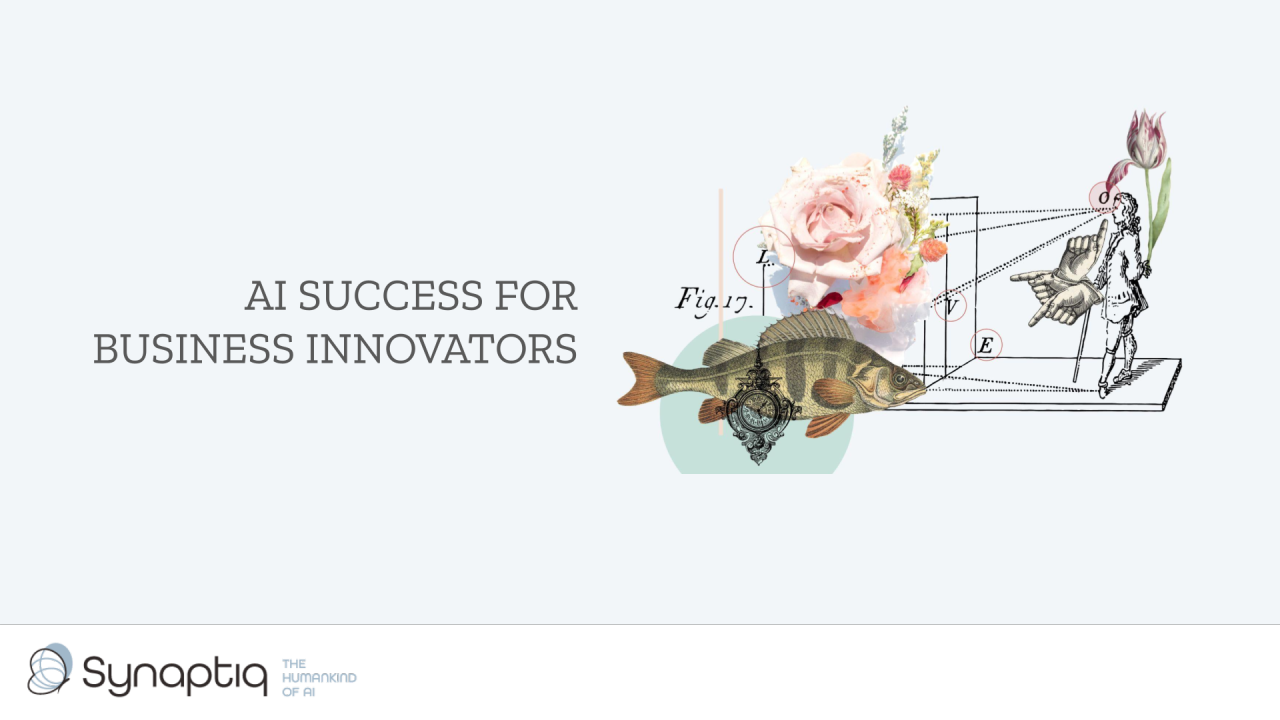4 min read
Data-Driven Product Managers Are the Future
By: Stephen Sklarew 1 Apr 29, 2025 12:25:55 PM

A few weeks ago I met a fellow seasoned product manager for lunch. We conversed at length about our origin stories, challenging experiences we had leading innovation at diverse companies, the future of jobs, and, inevitably, the future of product management.
Lucas Rizzotto's December 2022 post resonated with both of us.
A.I. won't replace humans, but the people who refuse to collaborate with A.I. will be replaced by the ones who don't.
Our conversation crystallized what I’ve been thinking about the last decade at the helm of Synaptiq:
Product managers must incorporate data-driven thinking to survive and flourish.
Prior to starting Synaptiq, I was a product leader. The roles I held in product management provided me with a firehose of learning opportunities. As VP of Product in a multinational software company, I learned there are really three types of product managers. The depth and breadth of a product manager typically depends on the size of the company and the diversity of their product suite:

A research product manager focuses on understanding the market and identifying and testing ideas and concepts to find worthwhile opportunities for the business to pursue. An engineering product manager often leads product design and oversees the development of the product (partnering with engineering leadership) with a customer and user-focus. And, finally, a go-to-market product manager partners with product marketing to define and execute the go-to-market plan ensuring customers are aware of the product, purchase the product, and continue using the product.
I was a technology leader prior to becoming a product manager; so, the engineering area was natural to me. But the research and go-to-market facets required me to hastily build a new set of skills and learn about sales, marketing, finance, legal, and operations.
As a newly minted software product manager, I was surprised most of my peers and staff lacked programming skills. They were exceptional at understanding market needs, eliciting and documenting customer problems, and executing go-to-market strategies. At best, they knew how to manipulate spreadsheets with advanced functions like vlookups() or how to write simple SQL statements. However, they fled when anyone attempted to share code or technical information with them.

In light of AI crossing the chasm and rapidly becoming incorporated into products and business operations, product managers must integrate AI into their workflow and understand data-driven software features and processes.
This “data-driven thinking” is a requirement for all facets of product management. A well-rounded product manager must:
A. Use Generative AI tools and iterative prompt engineering to accelerate:
Researching markets and customers,
Documenting product requirement documents, and
Preparing go-to-market plans and materials.
B. Think deeply about business processes, the data that supports them, and how to best capture quality data to automate them.
C. Understand the pros and cons of hard-coded business-rules in software and data-driven predictive models and how to identify opportunities for one or the other.
D. Partner closely with domain experts and experienced data scientists to quickly assess the viability of business problems that can be solved with custom or off-the-shelf AI models.
E. Learn how AI is best incorporated into customer and user experiences.
As software engineering is swiftly evolving from programming in cryptic languages to natural language instructions, product managers have a unique opportunity to generate tremendous value now more than ever. Product managers know the natural language of the customer and their problems and pain points. And the few data-driven product managers that exist today (mostly startup founders) are already starting to build products on their own.
So, if you’re a product manager, a recovering product manager (like me), or someone that is considering the idea of going into product management, don’t wait to learn about data-driven product management, or you will be replaced by the ones that already have!
About Synaptiq
Synaptiq is an AI and data science consultancy based in Portland, Oregon. We collaborate with our clients to develop human-centered products and solutions. We uphold a strong commitment to ethics and innovation.
Contact us if you have a problem to solve, a process to refine, or a question to ask.
You can learn more about our story through our past projects, blog, or podcast.
Additional Reading:
The ROI of AI
AI initiatives rarely collapse in obvious ways. There’s no single moment where a model “breaks” or a system stops...
December 30, 2025
Guardrails - Keeping LLMs on Track and Your Business Thriving
Generative AI systems rarely fail in obvious ways. They don’t crash outright or announce when something has gone wrong....
December 30, 2025










